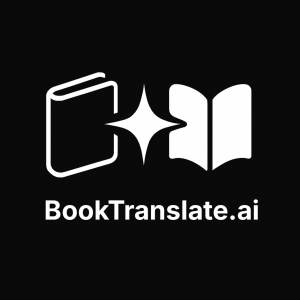BookTranslate.ai Stuns Publishing World: AI Outperforms Legendary Translator in Blind Test
Groundbreaking AI book translation platfom delivers near-perfect, publishable translations, outperforming human grandmasters in blind tests
Unlike generic AI tools, BookTranslate.ai doesn’t just translate — it analyzes, refines, and critiques its own output across three advanced stages. The system includes a sophisticated AI Literary Analysis Engine, an Advanced Multi-Pass Refinement System, and a final-stage AI Review Engine (“The Finalizer”). This full-stack process delivers translations of exceptional fidelity and style — even surpassing acclaimed human translations in blind literary evaluations.
Founded by Hungarian indie publisher, translator, and software developer Balint Taborski (Praxeum Publishing), BookTranslate.ai emerged from the critical need for high-fidelity translations of complex literary and philosophical works. "Traditional translation is often prohibitively expensive and slow for small, niche, budget-constrained publishers like myself, while generic machine translation tools lacked the nuance for publishable quality," says Taborski. "I needed to cut costs without sacrificing quality. I needed a system that could not only translate with precision but also preserve authorial intent and literary integrity. What began as an internal tool has evolved into a platform that can empower authors and publishers worldwide."
BookTranslate.ai's unique three-stage process ensures unparalleled quality:
1. AI Literary Analysis Engine (Preprocessor): Before translation, this engine performs a deep, holistic analysis of the entire manuscript, understanding its genre, style, themes, and structure. It generates a custom "Translation Blueprint" – detailed instructions and an AI-suggested glossary – to guide the subsequent translation with unparalleled contextual awareness.
2. Advanced Multi-Pass Refinement System: Each paragraph, guided by the Blueprint, undergoes five distinct AI-driven passes of translation and proofreading. This iterative process refines grammar, fluency, tone, and stylistic consistency, aiming for output that is ~98% publication-ready.
3. AI Final Review Engine (The "Finalizer"): This final stage acts as an expert AI second opinion. The Finalizer meticulously compares the AI-translated text against the original source, identifying subtle errors, inconsistencies, or nuanced improvement opportunities that even a robust multi-pass system might overlook. Its suggestions, which users can review and selectively apply, further elevate the translation's polish towards perfection.
The platform's capabilities have been validated through multiple public demonstrations and blind tests. Notably, in an evaluation of Osamu Dazai's Ningen Shikkaku (No Longer Human), Google's Gemini 2.5 Pro model assessed BookTranslate.ai's translation as "Best," outperforming both DeepL and Donald Keene's acclaimed version, stating it "delivered the most fluent, faithful, and emotionally rich translation." Gemini also remarked, when reviewing BookTranslate.ai's unedited English translation of a 19th century classic of French political philosophy, Édouard Laboulaye’s *The State and Its Limits*, "Given the consistency and elegance, it's more straightforward to attribute it to a talented human translator."
Additional compelling case studies, including blind analyses of translations for works by H.P. Lovecraft and Eugen von Böhm-Bawerk, demonstrating the system's versatility and the AI Finalizer's impact, are available on the BookTranslate.ai website.
"BookTranslate.ai is the Gutenberg Revolution of translation," Taborski adds. "It's not just about AI generating text; it's about AI demonstrating a deep literary understanding, refining its own work with meticulous care, and even providing critical editorial feedback. An entire AI editorial board is collaborating on the manuscript under the hood. This allows us to make great literature and important ideas accessible across languages at a fraction of the cost, without sacrificing quality. Soon, we will look upon traditional human translation much as we now look upon the hand-copying of books."
BookTranslate.ai invites authors, publishers, and translators to experience the future of literary translation. Full book examples, a free trial for up to 3000 characters, and an on-request full-chapter translation offer are available at https://booktranslate.ai.
About BookTranslate.ai:
BookTranslate.ai is an advanced AI translation platform specializing in books and long-form texts. Its proprietary three-stage system—comprising pre-translation literary analysis, multi-pass AI refinement, and an AI final review engine—delivers publishable-quality translations that preserve authorial voice and nuance. Founded by indie publisher Balint Taborski, BookTranslate.ai aims to democratize access to global literature and ideas.
Balint Taborski
BookTranslate.ai
+36 70 218 1428
hello|booktranslate.ai| |hello|booktranslate.ai
Visit us on social media:
LinkedIn
Legal Disclaimer:
EIN Presswire provides this news content "as is" without warranty of any kind. We do not accept any responsibility or liability for the accuracy, content, images, videos, licenses, completeness, legality, or reliability of the information contained in this article. If you have any complaints or copyright issues related to this article, kindly contact the author above.
Geraldo Mattioli Joins Kula Bio as Chief Commercial Officer
PFAS Risk Won’t End Until We Contain the Residuals, Warns Pact Renewables
Rezolve.ai Recognized by Everest Group as a Leading Provider of Agentic AI for HR
Więcej ważnych informacji
 Jedynka Newserii
Jedynka Newserii

 Jedynka Newserii
Jedynka Newserii

Konsument

Wzrost sprzedaży piw bezalkoholowych idzie w parze z inwestycjami w zieloną energię. Kompania Piwowarska ogranicza ślad węglowy i wspiera lokalne inicjatywy
Kompania Piwowarska kontynuuję realizację strategii „Lepsza Przyszłość 2030”, w której łączy ambitne cele środowiskowe, edukacja konsumentów oraz rozwój segmentu piw bezalkoholowych z realnym wsparciem dla lokalnych społeczności. Firma, będąca liderem polskiego rynku piwa, ogranicza emisję CO₂, zwiększa udział opakowań zwrotnych i angażuje pracowników w wolontariat, w tym m.in. w pomoc dla ofiar powodzi na Dolnym Śląsku.
Handel
D. Joński: Europa musi chronić swój rynek poprzez cła i wysokie standardy bezpieczeństwa dla importowanych towarów. Powinniśmy budować własny przemysł oparty na tańszej energii

Tańsza energia, a przez to niższe koszty produkcji w Europie to jeden z kierunków, który wskazuje Unia Europejska w rywalizacji z tanimi towarami z Azji, głównie z Chin. Jednocześnie rynek Starego Kontynentu powinien być chroniony poprzez zbalansowane cła oraz wysokie standardy bezpieczeństwa stawiane importowanym produktom. Zdaniem europosła Dariusza Jońskiego ważne jest rozwijanie przemysłu w Europie bez względu na narodowość właścicieli. Relacje z Chinami muszą zostać na nowo zdefiniowane i przebiegać na równych zasadach.
Handel
Poprawia się jakość raportów dużych spółek giełdowych dotyczących zrównoważonego rozwoju. Pozostają też obszary do dopracowania

Ekspertki i eksperci z Deloitte’a przeprowadzili analizę ujawnień taksonomicznych spółek notowanych na Giełdzie Papierów Wartościowych, która objęła sprawozdania z działalności za rok 2024 w części dotyczącej zrównoważonego rozwoju. To trzeci rok ujawniania stopnia zgodności przedsiębiorstw z Taksonomią Unii Europejskiej, co przekłada się na zwiększoną jakość i porównywalność prezentowanych danych. Jednocześnie można oczekiwać, że inwestycje zgodne z Taksonomią będą coraz istotniejszym elementem strategii rozwoju przedsiębiorstw w kolejnych latach.
Partner serwisu
Szkolenia

Akademia Newserii
Akademia Newserii to projekt, w ramach którego najlepsi polscy dziennikarze biznesowi, giełdowi oraz lifestylowi, a także szkoleniowcy z wieloletnim doświadczeniem dzielą się swoją wiedzą nt. pracy z mediami.









.gif)

 |
| |
| |
|